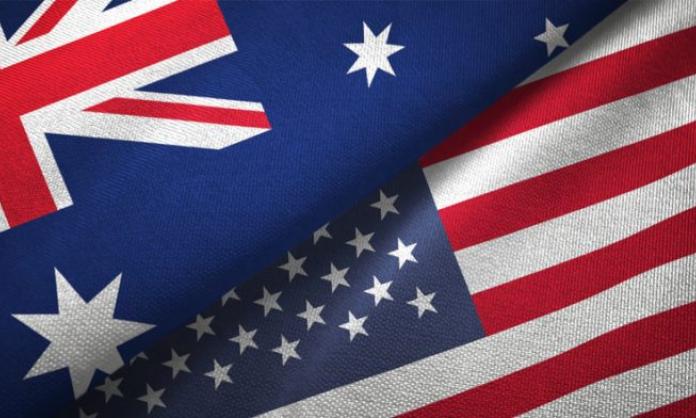If we don’t want Australia to be drawn into a devastating war with China that could cost tens if not hundreds of thousands, or even millions of lives, we need to break the military alliance with the United States.
That should be the obvious conclusion drawn from the last few weeks of feverish discussion in the press and among the political establishment.
But the idea of breaking the US alliance is not raised anywhere in the mainstream debate—even though it is the basic element driving us towards war.
If we abandoned the US alliance tomorrow, the chance that China would launch a military attack on Australia would reduce to almost zero.
As Paul Keating made clear in his appearance at the National Press Club, the idea that China poses an existential threat to the Australian state—which, short of annihilation courtesy of nuclear armed ICBMs, could only be carried out by a land invasion—is virtually nil.
A land invasion of Australia by the Chinese military would be doomed to failure. It isn’t remotely on the agenda. Keating was right to ridicule the squawking imbeciles of the press gallery—who with the earnest tone of private school debating society types who probably couldn’t find the South China Sea on a map, insisted that he take the “China threat” more seriously—by pointing out how idiotic the idea of a Chinese threat to Australia actually is.
In World War Two, an expansive and aggressive Japanese imperial state occupied much of south-east Asia. But it was never able to subjugate China, the huge but politically fractured landmass on its doorstep. Partly because of its incapacity to subdue China, Japan—a state so belligerent and reckless that it was prepared to wear the risks of a full-frontal assault on the US at Pearl Harbour—never even attempted an invasion of Australia.
Even then, before the advent of radar and satellite surveillance and instant communication, Australia’s geography made it, possibly aside from the US, the most militarily unassailable political entity on the planet.
But that isn’t to say—and it’s a point Keating avoided—that there is no possibility of major military conflict between Australia and China.
The “Red Alert” series in the Age and the Sydney Morning Herald was on the one hand precisely the warmongering hawkish propaganda that was, as its many critics pointed out, among the most egregious pieces of war propaganda in the history of an Australian press that has for more than a century been among the masters of the form.
But on the other hand, the danger it pointed to is real. A major military conflict between the US and China is not written in the stars, but it is increasingly possible. We are entering a new era of inter-imperialist rivalry that is making the possibility of conflict between the great powers more likely in the next few decades than at any time since 1914.
People in Australia should be worried about war with China. The Age/SMH headline writers are right about that. But their war-fever articles miss the crucial point. The only reason there is any chance of Australia being a part of such a war is because of our alliance with the United States.
As things stand at the moment—and the AUKUS deal means this will only become more the case in coming years—the outbreak of a major war between the US and China would draw Australia in almost immediately. The US military installation at Pine Gap in central Australia would be an obvious target in the first days of a US-China Pacific war. US bases in northern Australia would be a safe-haven for US troops retreating from Japan or Guam, and as a result a target for Chinese intercontinental and submarine missiles, and air attack. Naval bases in Queensland, Western Australia and New South Wales would be major targets. And as an ally of the US, Australian civilian cities and infrastructure would be obvious soft targets for Chinese bombs and missiles.
All of these threats would disappear overnight if Australia ceased acting as a loyal outpost of the United States military in Asia. It is a statement of the bleeding obvious to say that there is no reason for China to attack Australia outside of the context of our alliance with the US.
So what points are put forth in opposition to the argument that Australia should withdraw from the US alliance? Well, in one way, hardly any. Even Paul Keating, who has so upset the press gallery lemmings-parade over the last week, doesn’t question anything fundamental about the US alliance. Indeed he says (correctly!) in his defence that he has spent most of his life warring with the left in defence of the US military industrial complex.
The fact that Keating is the only major figure in the Labor Party willing to take a stand against the insanity of the AUKUS deal—he says that Prime Minister Anthony Albanese and Foreign Minister Penny Wong make him and his mates from the Tammany Hall NSW right look like Bolsheviks—is an utter indictment of the party in general and its laughably termed “left” in particular.
But the Keating position, echoed by Hugh White and others in and around the “China dove” wing of the security establishment, is essentially the “eyes closed tight” position. Don’t argue for the US alliance, but don’t attack it either. Ignore or downplay the increasing hostility between the US and China and hope it goes away, or, at best, can be managed. We can be friends with both of them and hopefully it will work out. This was the position of the Australian ruling class as a whole until a few years ago.
But what of the people who want to really defend the US alliance? There is no “defence of Australia” argument in favour of it. The closest that anyone comes to that is a vague thing about Australia needing access to sea lanes because of our dependence on imports. But if we weren’t aligned with the US, why would China close off any sea lanes to ships going to and from Australia?
The real argument is that there is a contest between the US and China for control of the western Pacific, and Australia should side with the US because it is a historic ally and, though no one says it, because it is “like us”, i.e. mostly white and English speaking. We might have liked peaceful coexistence, but we have to take sides, and there is no way a white colonial society like Australia is going to side with China against the US, so the US it is.
There’s no moral justification for the US to control (sorry, “have a presence”) in the western Pacific. You don’t need to have any sympathy for the Chinese state (and for evidence that we at Red Flag don’t have any, read Ben Hillier’s extensive coverage of the uprising in Hong Kong in 2019) to understand that there is no question that the US, not China, is the aggressive imperial power in the region.
US bases in Guam, the Philippines, Japan, South Korea and elsewhere all threaten the Chinese mainland and its core shipping routes. The US Pacific Fleet constantly conducts provocative “freedom of navigation exercises” just miles from the Chinese mainland. This is the equivalent of if China installed military bases in Cuba, Jamaica and Mexico, and routinely sent its warships on missions that took it within miles of the California coast.
Of course, this has happened in history. German submarines did patrol the US coast in the early part of World War Two. The USSR did try to install nuclear weapons in Cuba during the Cold War. In the first instance, the German subs were an important part of the US decision to join the war. In the second, we got the “Cuban missile crisis” that, before the USSR backed down, brought the world closer to nuclear Armageddon than perhaps any other time in history.
Why would anyone expect China to be more understanding when it responds to the only power in the world to have ever used nuclear weapons?
We shouldn’t. That doesn’t mean we should give China a free pass. It is the new great capitalist power, as much imperialist in ideology and in form as the US empire it opposes. In the coming great conflagration between the old and the new, we should remember that in momentous struggles of the past, it was the United States that defeated and eclipsed the old empires, and the world that gave us is the world we have today.
Socialists and leftists of all kinds in Australia should oppose and resist this drive to a new imperial war. We are internationalists. Our enemy is all the imperial warmongers—whatever their country, whatever side they fight for. But we in Australia have a special responsibility in the global struggle against war. We need to get our country out of it. That means, immediately here and now, fighting our own ruling class and getting Australia out of the US alliance.









